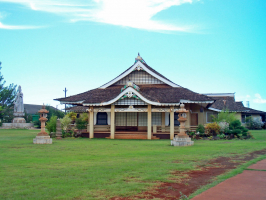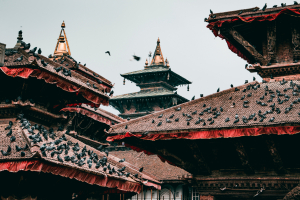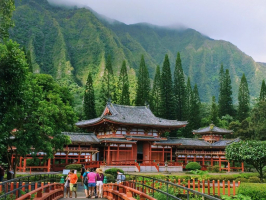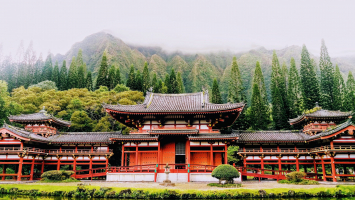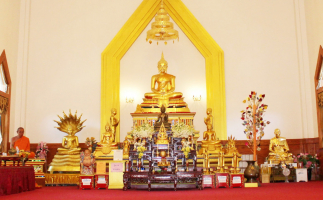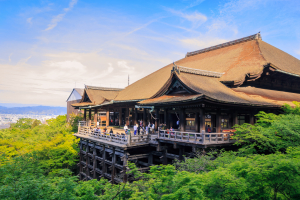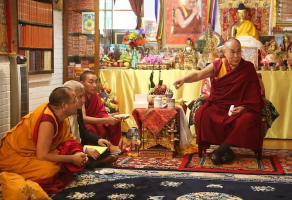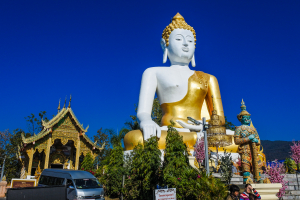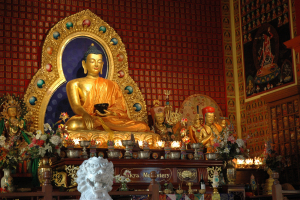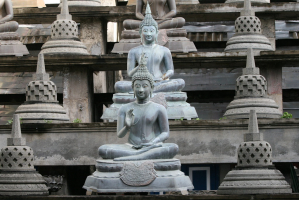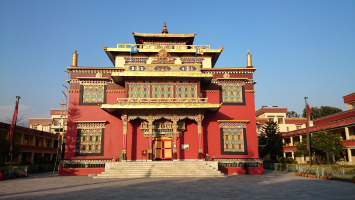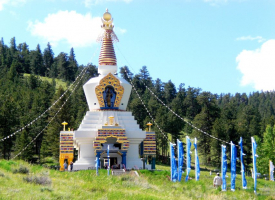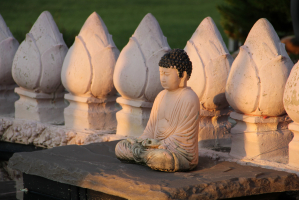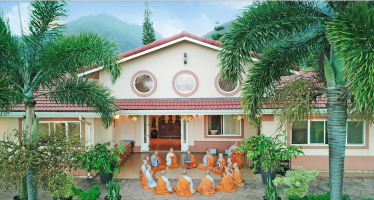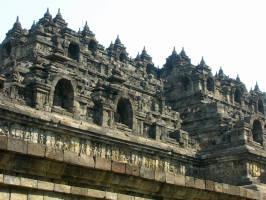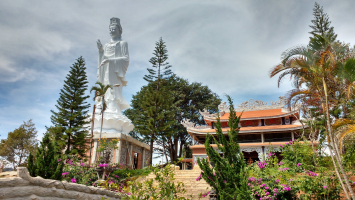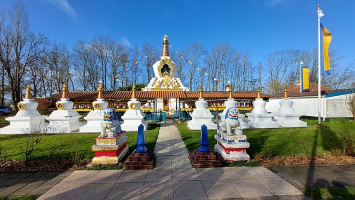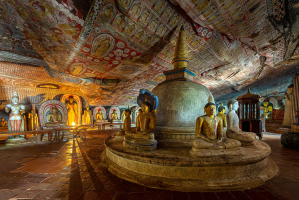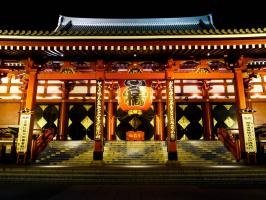Top 10 Best Buddhist Temples in Hawaii
Buddhist temples in Hawaii are like peaceful getaways where people can learn about Buddhist teachings and find calmness. From Kauai's green landscapes to ... read more...Oahu's lively communities, we explored the ten best Buddhist temples in Hawaii, and each has its unique charm.
-
Established in 1910, the Koloa Jodo Mission is a Buddhist temple in Koloa on the island of Kauai, Hawaii. Rooted in the Jodo Shu school of Buddhism, a Pure Land tradition, the temple has served as a spiritual and cultural focal point for the local Japanese immigrant community. Its architecture, characterized by traditional Japanese elements such as a pagoda and main hall, reflects the cultural heritage of its founders.
Beyond its religious functions, the Koloa Jodo Mission has become a vital cultural and spiritual hub. The temple provides a serene space for worship, meditation, and the practice of Buddhist teachings. The temple hosts various cultural events, ceremonies, and festivals throughout the year, contributing to the rich tapestry of tradition.
One notable feature of the temple is its Jizo statue, a familiar figure in Japanese Buddhism symbolizing protection and the well-being of children. The presence of the Jizo statue underscores the compassionate and nurturing aspects inherent in the temple's teachings.
Open to visitors, the Koloa Jodo Mission invites individuals to explore its grounds, appreciate its architecture, and gain insights into the history and teachings of the Jodo Shu tradition. The temple's welcoming atmosphere extends beyond its walls, engaging with the broader community to foster understanding and appreciation of Japanese culture and Buddhism.
In addition to its religious and cultural functions, the Koloa Jodo Mission plays a role in preserving and maintaining Japanese cultural and religious traditions in the Hawaiian context. It is a testament to the enduring connections between Hawaii and Japan, offering a unique and enriching experience for those seeking to explore the intersection of culture and spirituality.Detailed information:
- Address: 3480 Waikomo Rd, Koloa, HI 96756, United States
- Phone: +1 808-742-6735
- Website: https://www.koloajodo.com/
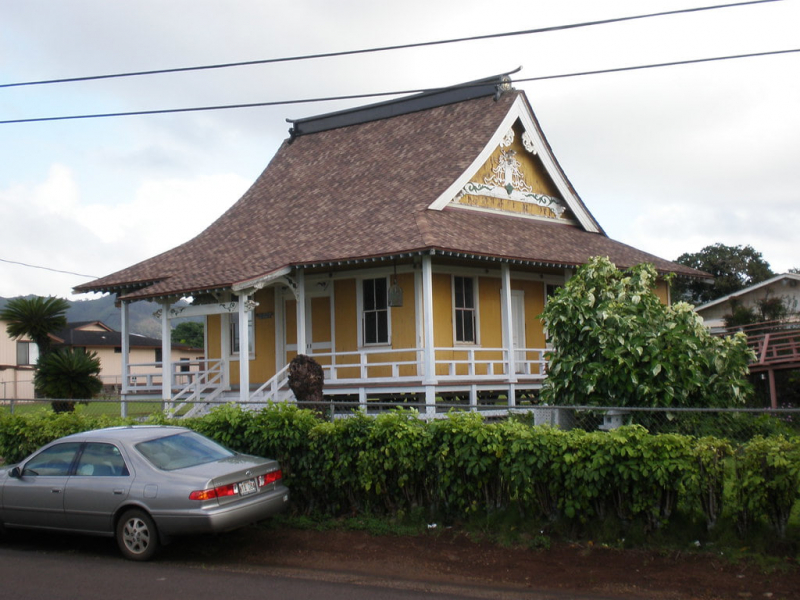
Photo of https://www.flickr.com/photos/40295335@N00/4159940083 Video by Kosen Ishikawa -
The next name on the list of best Buddhist temples in Hawaii is Kauai Soto Zen Temple Zenshuji or Zenshuji. Situated alongside the Kaumualii Highway in Hanapepe, the Zenshuji Temple captivates with its picturesque garden and distinctive architecture. Originating in 1918, the temple was constructed by Japanese camp residents during Kauai's plantation era to address the community's need for a place that served both as a church and a language school.
While Kauai Soto Zen Temple Zenshuji is typically not open to the general public on regular days, an exception is made every August for the annual Bon Dance festival, extending a warm invitation to visitors. This festive celebration, rooted in a 500-year-old tradition, allows residents to pay homage to their ancestors' spirits through rhythmic dances accompanied by the resounding beats of Taiko drums.
Throughout the Bon Dance festival, the Kauai Soto Zen Temple Zenshuji opens its doors for public viewing, transforming its garden into a lively spectacle. Dancers adorned in vibrant summer kimonos gracefully fill the space, moving to the tunes of cheerful traditional music. Visitors are welcome and encouraged to join the festivities, armed with their Bon Dance towels. The event draws a diverse crowd, with individuals of all ages and backgrounds converging to partake in the grand dance.
The barbecue is fired up as part of the celebration, offering plate dinners at a nominal fee. Attendees can also explore a rummage sale featuring homemade Japanese treats. Families with children will find engaging games for the youngsters, while everyone can relish the delightful Hawaiian shaved ice available at the festival. The Zenshuji Temple's Bon Dance festival thus becomes a vibrant and inclusive occasion, blending cultural traditions with community spirit and inviting all to participate in its joyous festivities.Detailed information:
- Address: 1-3500 Kaumualii Hwy, Hanapepe, HI 96716, United States
- Phone: +1 808-335-3521
- Website: https://kauaisotozen.org/
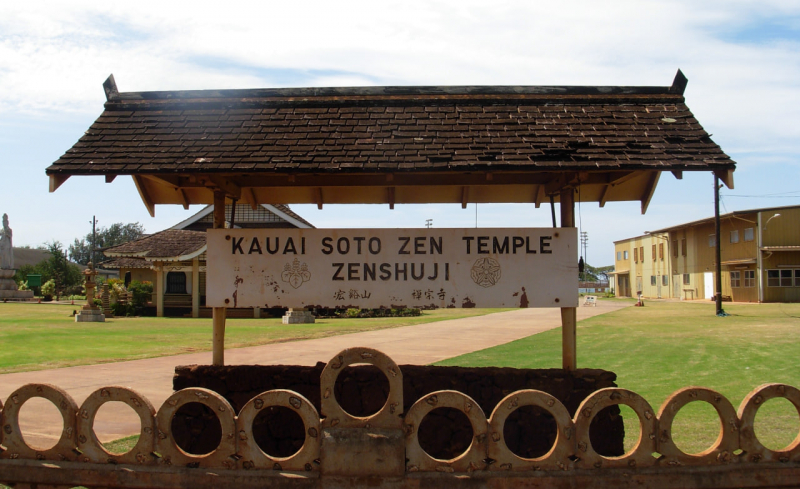
https://commons.wikimedia.org/wiki/File:Kauai_Soto_Zen_Buddhist_Temple_%282456054359%29.jpg 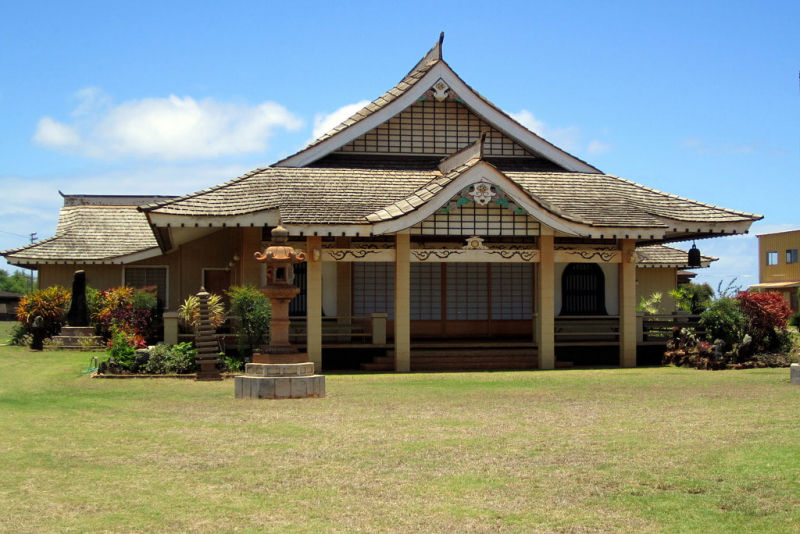
https://www.flickr.com/photos/wallyg/4667352219 -
The Lāhainā Jodo Mission must be mentioned in the list of the best Buddhist temples in Hawaii. Situated in Lahaina on the island of Maui, this temple holds historical significance as a Buddhist temple representing the Jodo Shu school. Established in 1912 by Japanese immigrants who arrived to work in Hawaii's sugar and pineapple plantations, the mission served as a spiritual anchor and community center for Lahaina's Japanese immigrant population.
The architectural design of the Lāhainā Jodo Mission is a unique blend of traditional Japanese influences and elements of Hawaiian architecture. Notable features include a giant Buddha statue, a pagoda, and beautifully landscaped gardens, reflecting the cultural fusion that occurred as Japanese immigrants adapted to their new home in Hawaii.
Central to the mission's significance is the imposing Amida Buddha statue, symbolizing enlightenment and compassion in the context of Pure Land Buddhism. This statue is a focal point for ceremonies and spiritual practices within the temple. Throughout the year, the Lāhainā Jodo Mission hosts various events and celebrations, with the Obon festivals particularly noteworthy. Obon, a traditional Buddhist event, is marked by dances, ceremonies, and the lighting of lanterns to honor ancestors.
In addition to its religious functions, the Lāhainā Jodo Mission is a cultural and community center. It offers educational programs and cultural events and serves as a gathering place for the local community. The temple is open to visitors, welcoming people of all faiths to explore its grounds, participate in meditation, and gain insight into Buddhist teachings. The serene atmosphere and the temple's ocean-side location in Lahaina further contribute to the overall experience.
A visit to the Lāhainā Jodo Mission allows tourists and locals to delve into the rich cultural and spiritual heritage of the Japanese immigrant community in Hawaii. The unique architectural synthesis and the incorporation of traditional practices make it a site of historical and cultural importance on the island of Maui.Detailed information:
- Address: 12 Ala Moana St, Lahaina, HI 96761, United States
- Phone: +1 808-661-4304
- Facebook: https://www.facebook.com/LJMFarmersMarket/
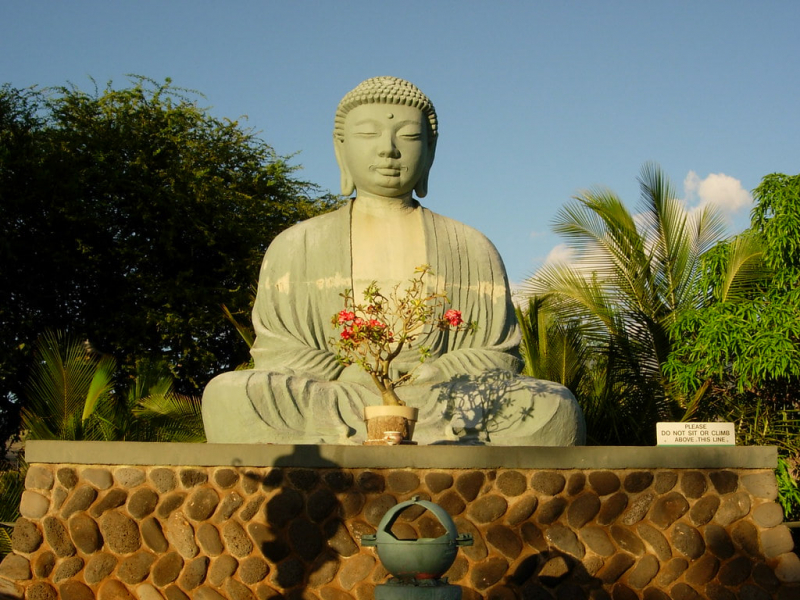
Photo of https://www.flickr.com/photos/aimeedars/3161688755 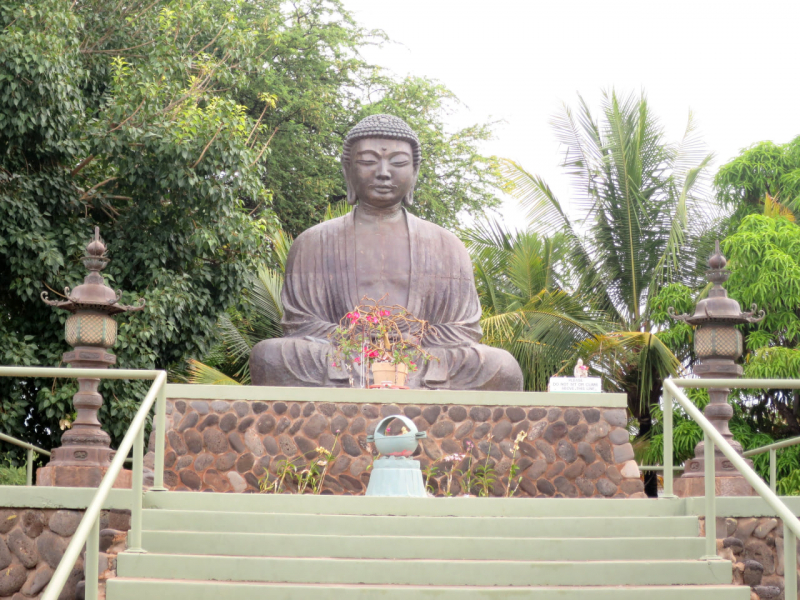
Photo of https://commons.wikimedia.org/wiki/File:The_Great_Amida_Buddha,_Lahaina_Jodo_Mission.JPG -
Mu Ryang Sa Temple is the most prominent Korean Buddhist Temple in Hawaii. It sits on a 1.5-acre piece of land where a group of monks live. The temple is well-known for its peaceful atmosphere and has more than 1,000 small statues of followers around its grounds. It's a quiet place for anyone looking for comfort. In the temple's ponds, there are colorful flowers and turtles. Visitors will also see the eye-catching Peace Pagoda, a bright copy of an important temple in Korea.
The temple gets its name, Mu-Ryang-Sa, which means "Broken Ridge Temple," because of a unique feature: the broken ridge on top of the building. This seeming imperfection has a story and an essential Buddhist lesson. Building work began in 1980, but as it progressed, it was discovered that the main hall's roof was too tall according to City and County rules. As a result, the top was brought down to its current height. This change turned what might look like a mistake into a significant part of the temple's history.
The temple's abbot, Do-Hyun, arrived in Hawaii in 1979 during Mu Ryang Sa's foundational stages. Following a four-year stay, he pursued undergraduate studies in Psychology, Chinese Literature, and Sanskrit at Berkeley University, later obtaining his master's degree from Beijing University. Returning to Honolulu in 1996, Abbot Do Hyun assumed leadership of Mu Ryang Sa.
Mu Ryang Sa Temple welcomes the community and invites people to attend Sunday services in Korean and English. Visitors can explore the extensive grounds from 9 am to 5 pm on weekdays and find comfort in the open Great Hero Hall, which is always available for meditation. The temple holds a Korean service every Sunday from 10 am to 12 pm, promoting an inclusive atmosphere. Additionally, there is a Vipassana Meditation Sitting every Saturday at 4 pm, led by Dr. Gregory Pai. The temple is open to everyone, offering a calm space for reflection and spiritual connection.Detailed information:
- Address: 2420 Halelaau Pl, Honolulu, HI 96816, United States
- Phone: +1 808-735-7858
- Website: https://muryangsatemple.com/
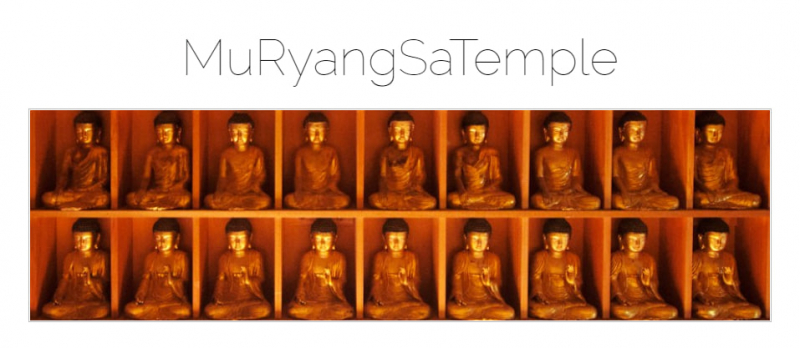
Screenshot of https://muryangsatemple.com/ 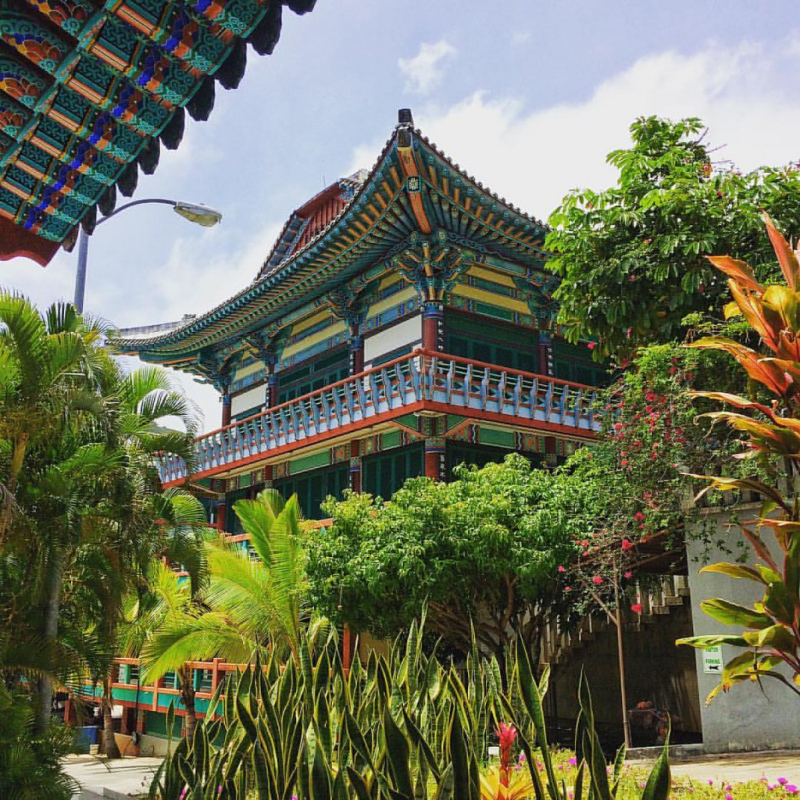
Photo of https://www.flickr.com/photos/remembertobreathe/27408449035 -
The Honpa Hongwanji Mission of Hawaii (HHMH) is a Buddhist organization in Hawaii that has been around for a long time. It started in 1889 when Japanese people came to Hawaii. The HHMH follows the Jodo Shinshu tradition, a type of Pure Land Buddhism. This tradition focuses on the teachings of Shinran Shonin and the idea of "Nembutsu," where people say the name of Amida Buddha to show gratitude for enlightenment.
The organization has different temples in Hawaii, and the main one is the Honpa Hongwanji Hawaii Betsuin in Honolulu. They also have temples on other islands like Maui, Kauai, and the Big Island. Each temple is a place for religious and community activities.
The HHMH holds regular religious services, ceremonies, and educational programs. This includes weekly services, talks about Buddhist teachings, study classes, and events for critical Buddhist holidays. They also greatly help the community by providing social services and cultural events. The organization works with other groups and participates in activities with people from different religions.
One crucial thing the HHMH does is preserve and share Japanese and Buddhist culture in Hawaii. This includes special ceremonies, cultural festivals, and educational programs about Buddhism. The organization also cares about education. They offer classes for kids and adults to learn about Buddhist ideas, how to live a good life, and what's essential in Buddhism.
Even though the HHMH has Japanese roots, it welcomes everyone, no matter where they're from. It's a part of Hawaii's diverse culture, and wants everyone to be a part of it.Detailed information:
- Address: 1727 Pali Highway, Honolulu, HI 96813
- Phone: +1 808-522-9200
- Website: https://hongwanjihawaii.com/
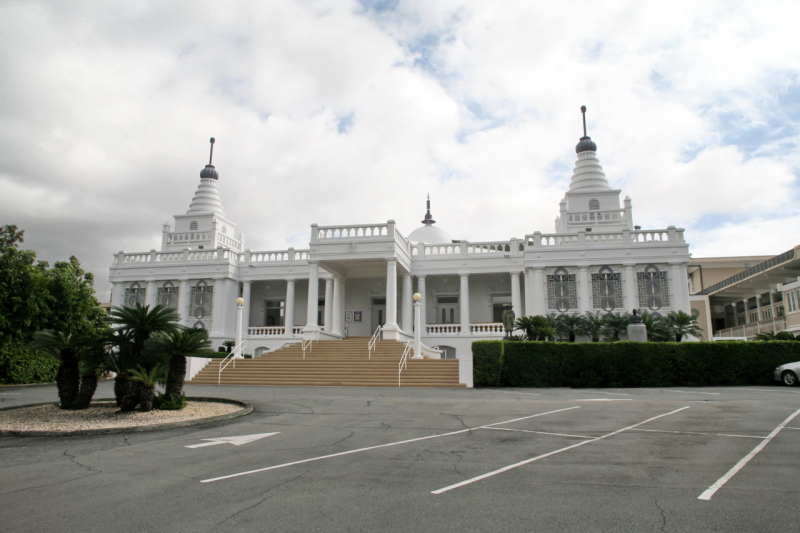
Screenshot of https://commons.wikimedia.org/wiki/File:Honpa_Hongwanji_Mission_of_Hawaii_%282853901515%29.jpg Video by Honpa Hongwanji Mission of Hawaii -
Fo Guang Shan is a prominent international Chinese Buddhist organization with a global presence, including temples and centers in various parts of the world, such as Hawaii. Venerable Master Hsing Yun founded Fo Guang Shan in Taiwan in 1967, and the organization promotes humanistic Buddhism. This approach emphasizes integrating Buddhist practice into everyday life for the benefit of society.
The philosophy of Humanistic Buddhism, advocated by Fo Guang Shan, encourages followers to engage in charitable activities, participate in cultural activities, and contribute to educational programs. The focus is on applying Buddhist principles to foster positive contributions to society.
Fo Guang Shan actively participates in cultural exchange endeavors, hosting events, exhibitions, and educational programs to promote community understanding and harmony. The Fo Guang Shan Hawaii Temple is likely a local branch of the organization situated in Hawaii. This temple is expected to provide regular religious services, meditation sessions, cultural events, and educational programs grounded in the teachings of Venerable Master Hsing Yun.
Community involvement is a hallmark of Fo Guang Shan temples, known for their active participation in community service. This may involve organizing charity events, cultural festivals, and outreach programs designed to benefit and engage with the local community.Detailed information:
- Address: 222 Queen St, Honolulu, HI 96813, United States
- Phone: +1 808-545-1183
- Website: https://www.fgshawaii.org/
Video by 佛光山人間衛視 Video by 佛光山人間衛視 -
Situated at the Valley of the Temples Memorial Park on Oahu's Windward side, near Kaneohe, the Byodo-In Temple stands as a non-denominational Buddhist temple in Hawaii. This temple was featured on popular TV shows such as "Hawaii Five-0." Nestled at the foot of the Ko'olau Mountains within the Valley of the Temples Memorial Park, the Byodo-In Temple is open to individuals of all faiths.
Byodo-In Temple provides a space for worship, meditation, or simply appreciating its beauty and historical significance as a non-practicing Buddhist temple. The well-maintained gardens and a sizable reflecting pond with koi fish contribute to the TTemple's serene ambiance. Established in 1963, the Byodo-In Temple is a Hawaii state landmark and one of the state's best-kept secrets.
A replica of the original Byodo-In Temple in Uji, Kyoto, Japan, which dates back to the 11th century and holds UNESCO World Heritage status, the Hawaiian counterpart was constructed in 1968 to mark the centenary of Japanese immigrants' arrival in Hawaii. Inside the temple, a standout feature is the nine-foot-tall Amida Buddha statue, adorned with gold leaf, symbolizing meditation and ranking among the largest of its kind outside Japan.
Adjacent to Byodo-In Temple stands the Bell House, housing a three-ton brass peace bell. Visitors are encouraged to ring the bell, signifying the universal spread of peace and compassion. Welcoming people of all faiths, the Byodo-In Temple serves as a space for meditation, contemplation, and spiritual reflection.
Hosting various ceremonial events, including weddings and memorial services, the Byodo-In Temple is a sought-after destination for tourists and locals seeking a tranquil retreat. With an admission fee for entry, the temple is typically open daily, urging visitors to respect and adhere to its guidelines. Offering a distinctive blend of cultural and spiritual experiences amidst Hawaii's breathtaking scenery, the Byodo-In Temple remains a must-visit for enthusiasts of Buddhism and traditional Japanese.Detailed information:
- Address: 47-200 Kahekili Hwy, Kaneohe, HI 96744, United States
- Phone: +1 808-201-3906
- Website: https://byodo-in.com/
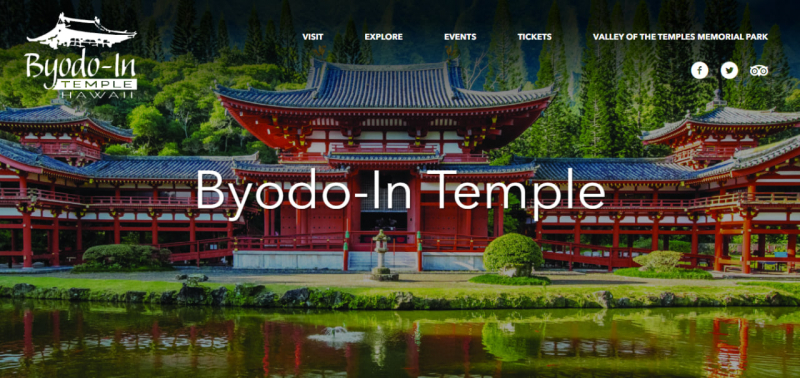
Screenshot of https://byodo-in.com/ 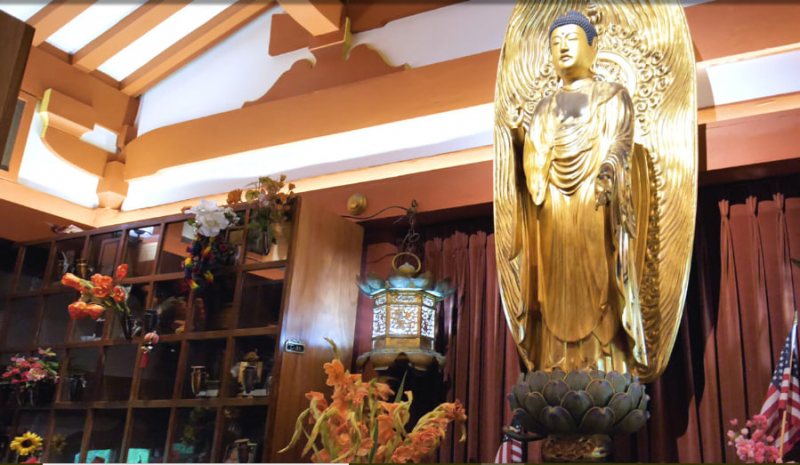
Screenshot of https://byodo-in.com/ -
Lawai International Center, a non-profit community project, is an archaeological and cultural treasure in a valley that has long been recognized as a healing sanctuary. Today, it is the only such site outside of Japan and is one of Hawaii's oldest Buddhist temple sites. Volunteers are bringing these shrines and this valley to prominence as an international center for compassion, education, and cultural understanding.
The Lawai International Center, situated on the island of Kauai in Hawaii, holds significant historical and cultural importance. Covering 32 acres, the center is home to the Hall of Compassion, a striking structure featuring 88 shrines representing diverse Buddhist and Shinto sects.
The architectural beauty of the Hall of Compassion reflects traditional Japanese design, providing visitors with a serene and spiritually enriching experience. The shrines within the hall are dedicated to various deities, contributing to the overall sense of tranquility that pervades the center. A notable feature of the Lawai International Center is the Path of Enlightenment, a journey along 88 shrines representing the 88 temples of the Shikoku Pilgrimage in Japan.
The center hosts various cultural events and festivals throughout the year, with the annual Pilgrimage of Compassion being a highlight. This event sees participants walking the Path of Enlightenment, contemplating themes of compassion and peace. In addition to its cultural and spiritual endeavors, the Lawai International Center is actively involved in community outreach and educational programs. Collaborations with local schools and organizations aim to promote cultural understanding and appreciation.
Visitors can explore the center through guided tours, gaining insights into each shrine's historical and cultural significance. The center, operating as a non-profit organization, relies on donations and community support to preserve and share the site's rich heritage.Detailed information:
- Address: 3381 Wawae Rd, Kalaheo, HI 96741, United States
- Phone: +1 808-639-5952
- Website: http://www.lawaicenter.org/pages/home.html
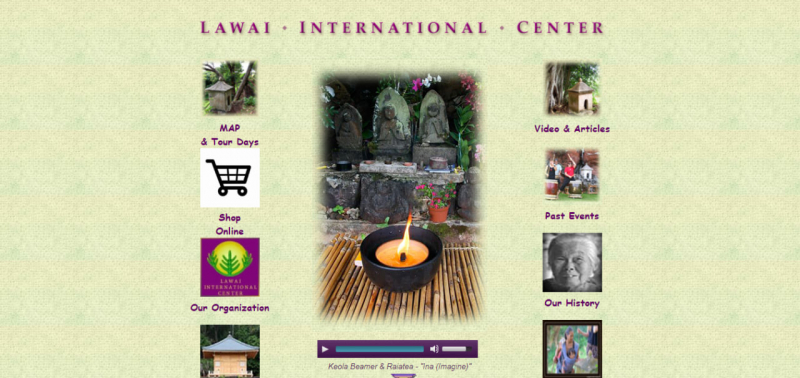
Screenshot of http://www.lawaicenter.org/pages/home.html Video by Kosen Ishikawa -
The Wailuku Jodo Mission, also known as the Wailuku Hongwanji Mission, stands as a testament to the enduring presence of Buddhism in the Hawaiian community. Situated in Wailuku, Maui, this temple is affiliated with the Jodo Shinshu school of Buddhism—a prominent branch emphasizing the concept of "Amida Buddha" and salvation through Amida's compassion.
With a rich history deeply intertwined with the immigration of the Japanese community to Hawaii, the Wailuku Jodo Mission has played a vital role in preserving and disseminating Buddhist teachings in the islands. Over the years, it has become a focal point for spiritual practice and community engagement.
An integral part of the temple's annual calendar is the Maui Obon Festival. This event, shared by many Buddhist temples in Hawaii, serves as a commemoration of ancestors. The festival features traditional dance (bon odori), music, and cultural activities, providing a time for the community to come together and celebrate.
Beyond the festival, the Wailuku Jodo Mission is known for its diverse activities and services. These include meditation sessions, Dharma talks, and community outreach programs. The temple's architecture may incorporate traditional Japanese design elements, creating a serene atmosphere for contemplation.
Moreover, the temple actively participates in community service and outreach, collaborating with other religious and community organizations to address social issues and contribute to the well-being of the broader community.Detailed information:
- Address: 67 Central Ave, Wailuku, HI 96793, United States
- Phone: +1 808-244-0066
- Website: https://www.hawaiijodo.net/temples/wailuku-jodo-mission/
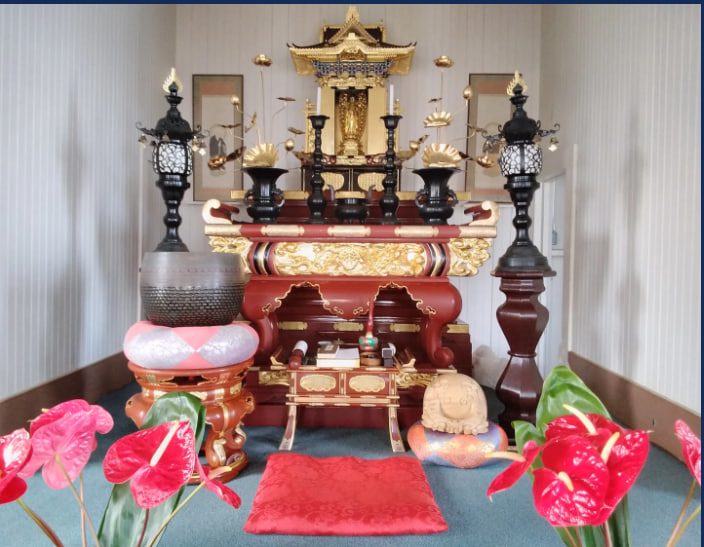
Screenshot of https://www.hawaiijodo.net/temples/wailuku-jodo-mission/ 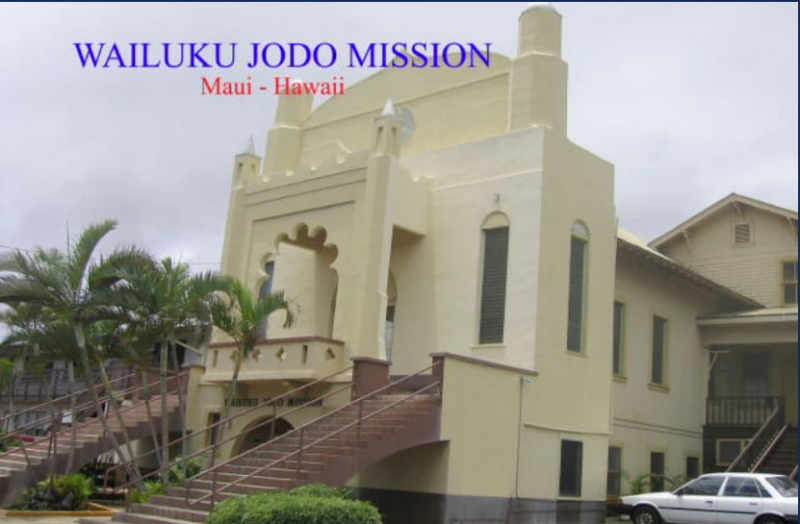
Video by Kauai's Hindu MonasteryScreenshot of https://www.hawaiijodo.net/temples/wailuku-jodo-mission/ -
Shingon Buddhism is a type of Japanese Vajrayana Buddhism that has its roots in the teachings of the early Indian Tantric traditions. It was brought to Japan in the 9th century by a monk named Kukai, also known as Kobo Daishi. Shingon Buddhism focuses on special rituals, meditation, and using specific words and pictures (mantras and mandalas).
Shingon temples, like the one in Kaneohe, usually have a variety of activities. These can include meditation sessions, special ceremonies, and teachings about Buddhist ideas. People visiting might get the chance to take part in events that show the unique rituals and practices of Shingon Buddhism.
Cultural events are essential for Shingon missions and other Buddhist temples in Hawaii. They often participate in or organize events and celebrations that unite the community and let them share their traditions.
Being part of the community is a big deal for temples. They often help in the community and do things like charity work, educational programs, and working with other religious groups and community organizations.
When it comes to how the temples look and the art they have, Shingon temples often have unique things, like pictures and objects used in rituals; the design of the temple is usually meaningful and shows the profound spiritual traditions of Shingon Buddhism, making it a special place for people who practice there and those who visit.Detailed information:
- Address: 915 Sheridan St, Honolulu, HI 96814, United States
- Phone: +1 808-941-5663
- Facebook: https://www.facebook.com/shingonhawaii/
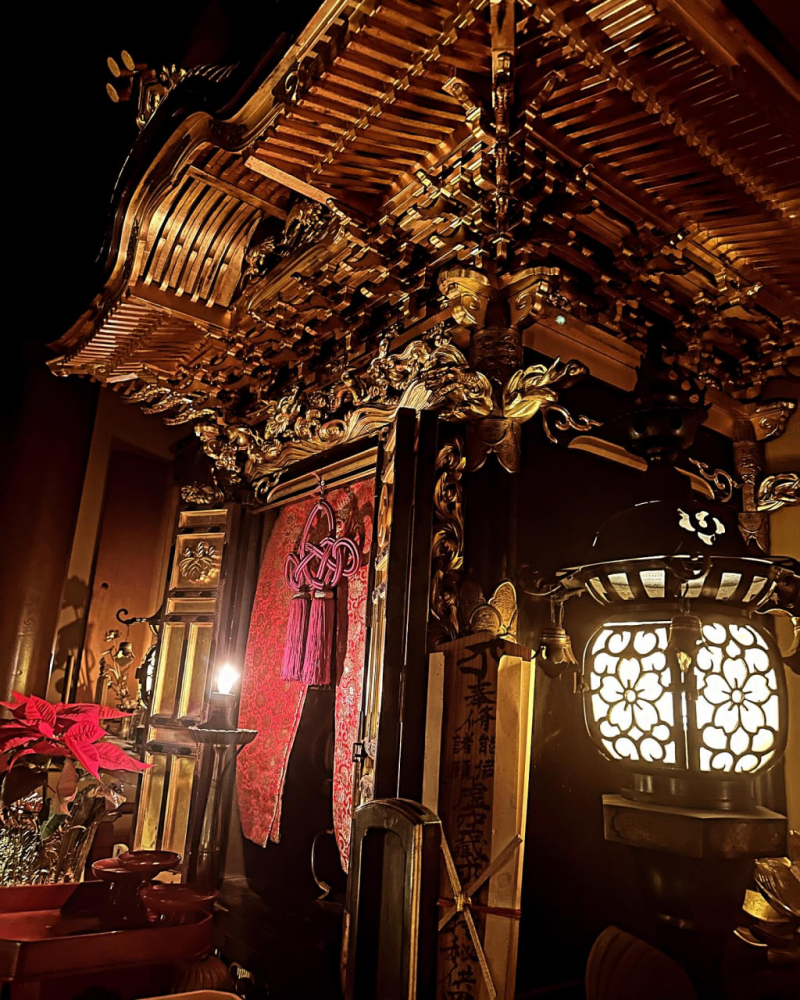
Screenshot of https://www.facebook.com/shingonhawaii/ 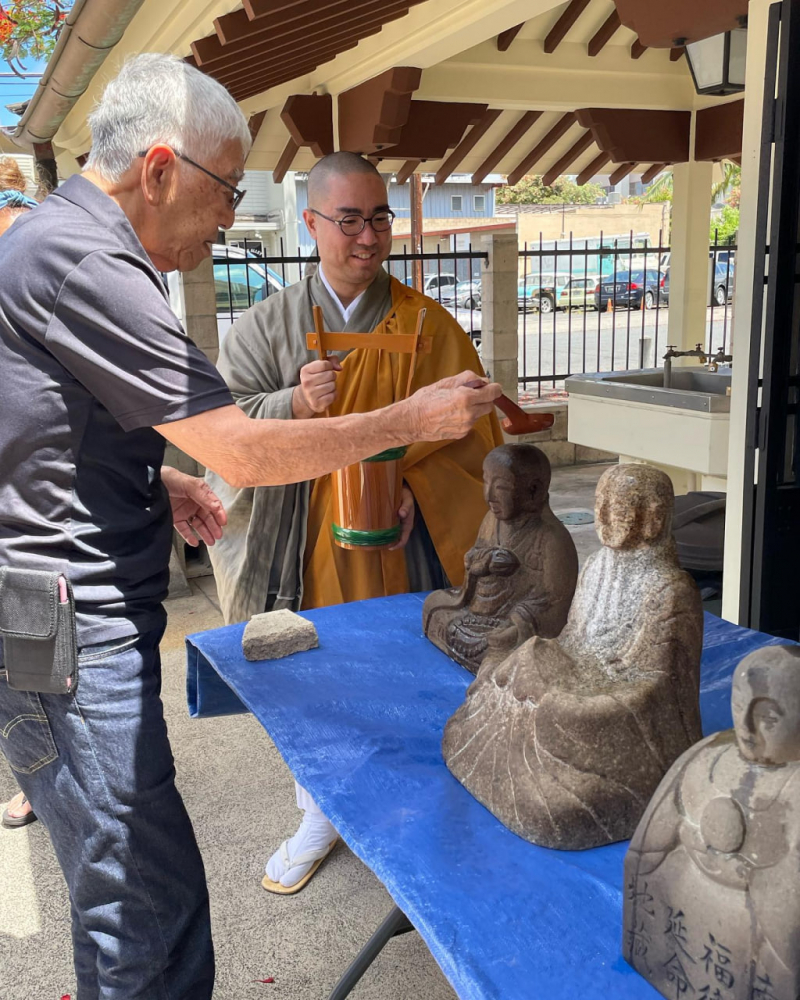
Screenshot of https://www.facebook.com/shingonhawaii/












